Natural Home Remedies for Oily Skin
By Dr Rajeev Singh +2 more

Get,

to manage your symptom
Get your,


4 Cr+ families
benefitted

OTP sent to 9988776655



You’ve successfully subscribed to receive
doctor-approved tips on
Whatsapp

Get ready to feel your best.

Hi There,
Download the PharmEasy App now!!


Register to Avail the Offer
Send OTPBy continuing, you agree with our Privacy Policy and Terms and Conditions

Hi There,
Sign up on PharmEasy now!!
Trusted by 4 crore+ families

OTP sent to 9988776655



You have unlocked 25% off on medicines




Code: NU25
By Dr Rajeev Singh +2 more
Table of Contents
Oily skin is a common problem many men and women face in their everyday lives. Oil on the skin gives it a shiny or greasy appearance. The skin of the face is rich in sebaceous or oil glands that produce sebum, which is a mixture of lipids. This sebum causes the skin to become oily. This sebum has several merits as well demerits. It acts as a protective barrier to the skin and performs antioxidant and antimicrobial functions. But excess sebum can block skin pores, impart oiliness to the skin, and nourish acne-causing bacteria that live on the surface. It also promotes the formation of acne1.
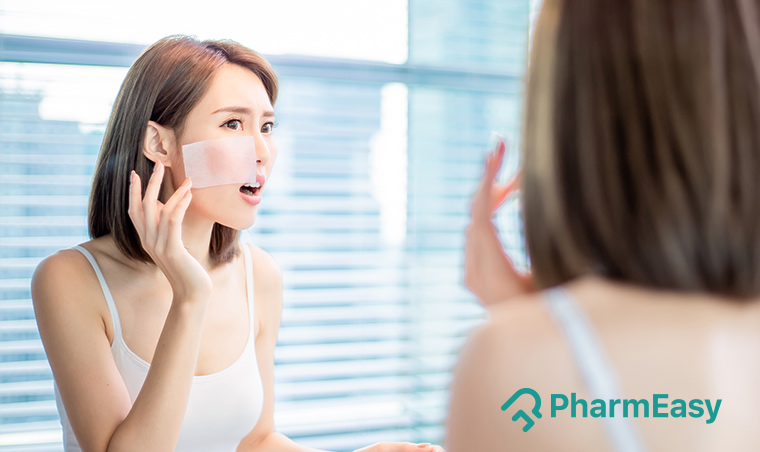
You might want to remove the excess oil from the face for these reasons. Several home remedies can help you get rid of that extra oil and leave you with fresh and glowing skin.
Astringent toners that contain alcohol tend to dry out the skin. However, a recent study shows natural astringents can have skin-soothing and anti-inflammatory properties.
Dr Ashish Bajaj, M.B.B.S, M.D. in Clinical Pharmacology and Toxicology
The sebaceous glands become oversized and start producing excessive sebum making the skin oily and greasy. The skin oiliness among people may vary depending on their age, climate, ethnicity, and gender1.
The factors listed below play a key role in oil production from the glands.
If you experience excessive oil on your face, your skin can:
Honey is a powerhouse when it comes to all things skin; it helps reduce excess oil, clears pores, moisturizes (without making skin oily), and has natural antiseptic and antibacterial properties that may benefit acne-prone skin. Lemon juice instantly brightens up your complexion; its citric acid also works as an astringent, helping to tone and control oily skin.
Dr. M.G. Kartheeka, MBBS, MD(Pediatrics)
You can use these remedies to get rid of excess oil and take care of your skin at home.
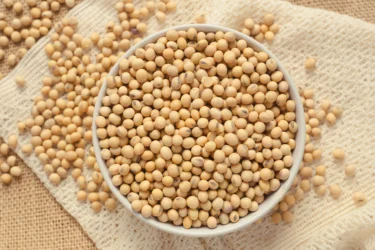
The application of soy on the skin can help control oil production and moisturise the skin3. You can take some soybeans, grind them into powder, and add some water to make a paste. You can apply this paste onto the skin to get rid of oiliness.
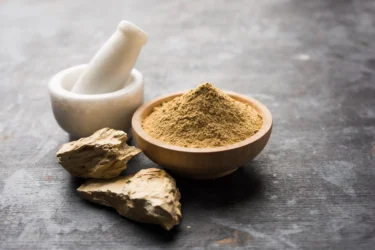
Fuller’s earth or Multani mitti is a perfect ingredient for oily skin. It acts as an absorbent and absorbs all the oil and dirt, giving fresh and glowing skin. You can make many facial packs using Multani mitti4. To make a herbal face pack using Multani mitti, take turmeric, sandalwood powder, gram flour and saffron. Mix these ingredients and add water to get a paste-like consistency. Then, apply this face mask to get rid of oily skin.
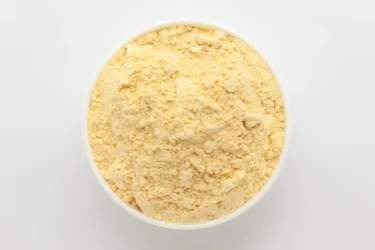
Gram flour or besan is a beneficial ingredient that reduces the skin’s oiliness and prevents acne4. Mix gram flour with some yoghurt and apply this paste evenly on the skin. Wash with cold water after some time when it is dried.
You can make another face pack using gram flour, sandalwood powder, and turmeric to enhance the effectiveness. Add sufficient water to make a paste and apply it evenly across the skin. Wash it off with cold water when it is dried.
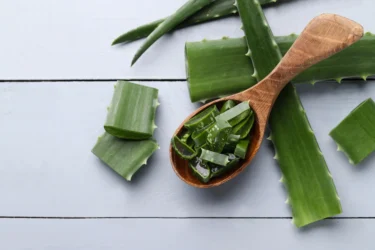
If you have oily skin, you can use aloe vera gel to prevent pimples and acne from forming on your face. If you have an oily face, you can also use aloe vera gel as a moisturiser as it rejuvenates the skin5.
Aloe vera gel face pack is a good remedy for oily skin. You can mix some aloe vera with Fuller’s earth to make a paste-like consistency and apply it to the face. Wash it off after some time.
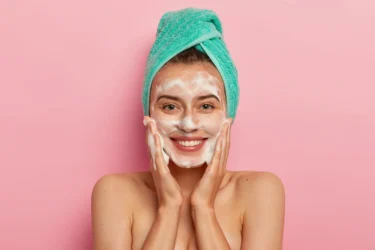
You need to wash your face as often as you can. You can wash your face in the morning, evening, and after exercising. Do not scrub, as it might irritate your skin and make it look worse. Washing the face will help control oily skin. You should avoid using a strong face wash to get rid of oil on the face. If you use a harsh face wash, it can irritate the skin and cause an increased production of oil, which will make the skin oilier. Choose a gentle and foaming face wash6.

You can use some blotting paper to wipe off any oil present on the face. Take some blotting paper, gently press it onto the skin surface, and let it absorb the oil. Avoid rubbing the paper all over your face, or you will spread the oil all over. You can use blotting paper throughout the day to manage oily skin6.
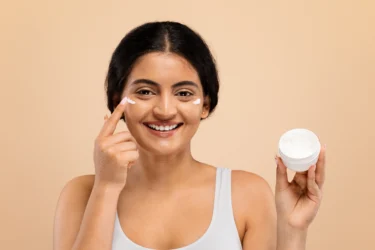
Don’t stop using moisturiser if you have oily skin. You still need to moisturise daily to keep the skin hydrated. When choosing a moisturiser, choose one that also has sunscreen in it, especially a broad-spectrum sunscreen. The sunscreen in it will protect your skin from the harmful ultraviolet rays and save you time6.
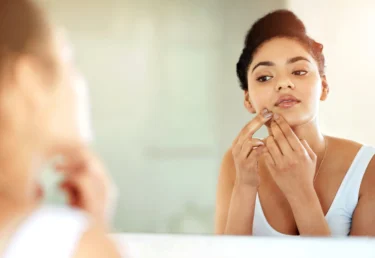
Whenever you touch your face, you transfer oil, bacteria, and dirt from your hands to your face. Before touching the face, make sure that you wash your hands. Also, you should avoid touching the face unless you are applying moisturiser, sunscreen, and makeup or washing the face6.

When buying products for your skin, choose the products which are labelled as oil-free or non-comedogenic (something that does not block pores and cause pimples). Choosing these oil-free products (makeup, cleansers, and moisturisers) will not clog the skin pores and help prevent acne6.
Also Read: Red Spots on Skin: Causes, Symptoms, Treatment and More!
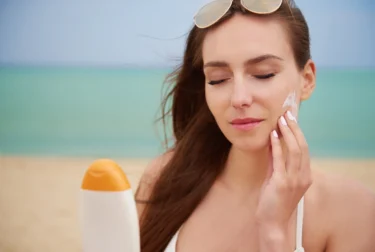
There are certain simple habits that you can follow to control the skin’s oiliness; these habits can help you manage oily skin.
Dermatologists recommend Cream or milky cleansers, as these will dissolve dirt and debris without disturbing the skin’s barrier function and natural moisture levels. Cleansers with BHAs (Beta Hydroxy Acids) or salicylic acid can really assist in dissolving excess oil.
Dr Ashish Bajaj, M.B.B.S, M.D. in Clinical Pharmacology and Toxicology
Oily skin is a common problem that does not lead to anything serious.
Also Read: Home Remedies For Tanned Skin
Excess oil on the face is a common problem encountered by men and women. Overproduction of sebum from the sebaceous glands makes the face oily. Though beneficial, the sebum can lead to acne and blackheads on the face. You follow simple home remedies to manage oily skin. Washing the face, moisturising, and using a blotting paper to absorb excess oil are helpful remedies to manage oil on the skin. You can also use ingredients like aloe vera, Fuller’s earth and gram flour to make face packs for oily skin.
If the oily skin is causing you concern or embarrassment, or if you also have acne, you can reach out to your healthcare provider.
Also Read: Simple Home Remedies For Acne Scars
You can make use of ingredients like aloe vera gel, gram flour, Fuller’s earth, and soy to get rid of oiliness. Gram flour and Fullers’ earth can be used to make face packs. Aloe vera gel can be massaged directly on the face to get rid of oily skin. Simple tricks like washing the face often and using blotting paper to absorb the excess oil from the face can help you take care of your skin3,6.
Sebaceous or oil glands present in the skin secrete a substance called sebum. These glands sometimes become enlarged and start overproducing sebum which makes the skin oily. Factors like age, gender, ethnicity and the climate affect the oiliness1.
Yes, oily skin can lead to acne. The presence of oil can block the pores present on the skin. Also, oily skin can become a breeding ground for acne-causing bacteria and promote acne1.
Yes, you can use aloe vera gel if you have oily skin. People with oily skin can use aloe vera gel as a moisturiser to prevent complications like acne and pimples5.
Yes, you still need to use moisturiser if you have oily skin. Having oily skin does not mean that you stop putting on moisturisers. Using a good moisturiser helps keep skin hydrated and healthy6.
Frequently washing the skin does not trigger sebum overproduction. It might cause preformed sebum to flow out through the skin pores, but it does not trigger sebum overproduction1.
If the presence of excessive oil on your face makes you uncomfortable, you can reach out to a dermatologist. Also, if you experience acne because of your oily skin, reach out to your doctor for advice6.
1. Sakuma TH, Maibach HI. Oily skin: an overview. Skin Pharmacol Physiol [Internet]. 2012 [cited 2022 May 17];25(5):227–35. Available from: https://pubmed.ncbi.nlm.nih.gov/22722766/
2. MedlinePlus Medical Encyclopedia. Oily skin [Internet]. [cited 2022 May 17]. Available from: https://medlineplus.gov/ency/article/002043.htm
3. Stallings AF, Lupo MP. Practical Uses of Botanicals in Skin Care. The Journal of Clinical and Aesthetic Dermatology [Internet]. 2009 Jan [cited 2022 May 17];2(1):36. Available from: https://www.ncbi.nlm.nih.gov/pmc/articles/PMC2958188/
4. Pal RS, Pal Y, Wal P. In-House Preparation and Standardization of Herbal Face Pack. The Open Dermatology Journal. 2017 Nov 7;11(1):72–80. Available from: https://www.researchgate.net/publication/320900643_In-House_Preparation_and_Standardization_of_Herbal_Face_Pack
5. Bhowmik D. Aloe Vera: The Miracle Plant Its Medicinal and Traditional Uses in India. Journal of Pharmacognosy and Phytochemistry [Internet]. 2012;1(4):119–26. Available from: https://www.researchgate.net/publication/304253232_Aloe_Vera_The_Miracle_Plant_Its_Medicinal_and_Traditional_Uses_in_India
6. American Academy of Dermatology Association. How to control oily skin [Internet]. [cited 2022 May 17]. Available from: https://www.aad.org/public/everyday-care/skin-care-basics/dry/oily-skin
Disclaimer: The information provided here is for educational/awareness purposes only and is not intended to be a substitute for medical treatment by a healthcare professional and should not be relied upon to diagnose or treat any medical condition. The reader should consult a registered medical practitioner to determine the appropriateness of the information and before consuming any medication. PharmEasy does not provide any guarantee or warranty (express or implied) regarding the accuracy, adequacy, completeness, legality, reliability or usefulness of the information; and disclaims any liability arising thereof.
Links and product recommendations in the information provided here are advertisements of third-party products available on the website. PharmEasy does not make any representation on the accuracy or suitability of such products/services. Advertisements do not influence the editorial decisions or content. The information in this blog is subject to change without notice. The authors and administrators reserve the right to modify, add, or remove content without notification. It is your responsibility to review this disclaimer regularly for any changes.
Comments

Leave your comment...
You may also like
Comments